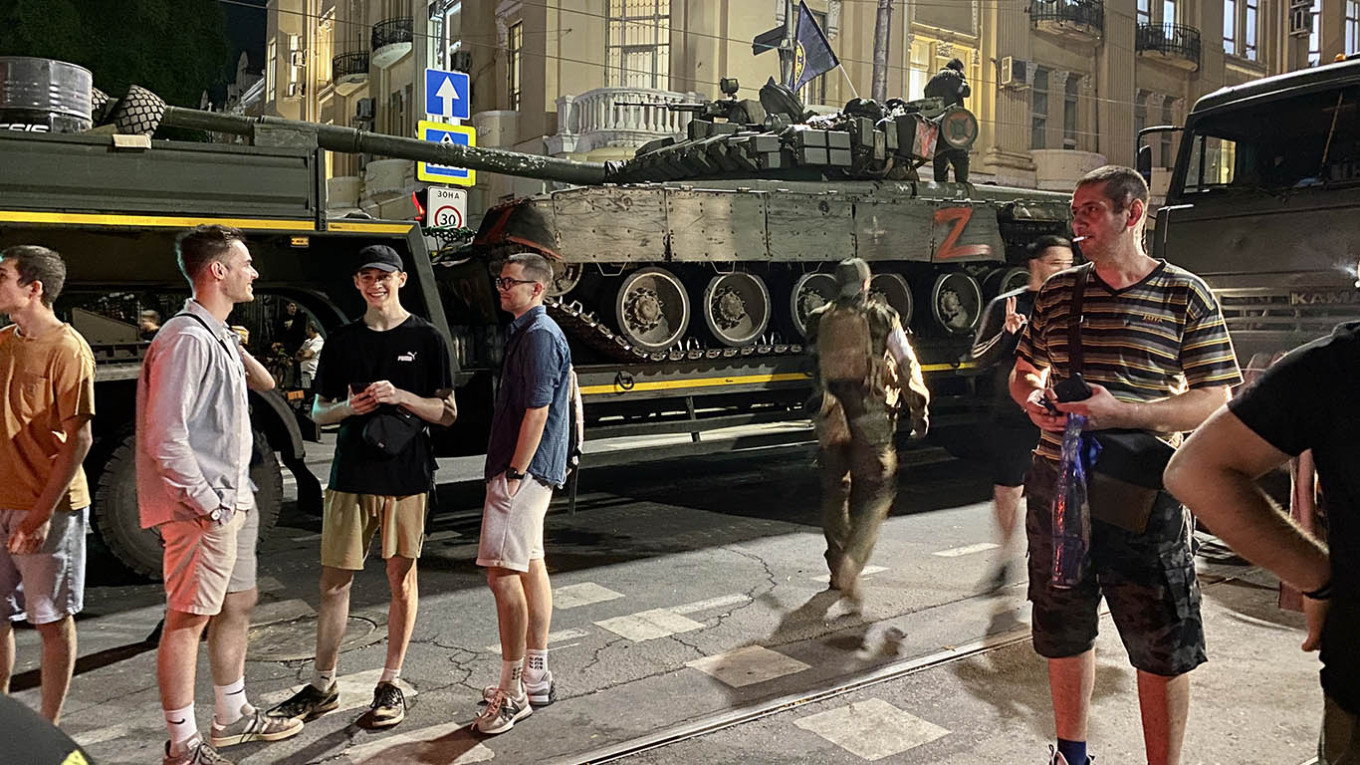A former worker at Yevgeny Prigozhin’s “troll factory,” a graduate student caught up in the turmoil, and a soldier hailing from Rostov-on-Don—where rebel forces had overtaken the city—shared their experiences from a tumultuous day in contemporary Russian history, two years after Wagner’s formidable uprising against the Russian military hierarchy. Their reflections were captured in interviews with The Moscow Times.
Polina, 22, was employed at RIA FAN, the St. Petersburg-based news agency notorious for being a central pillar of Prigozhin’s propaganda operations.
On the night of June 23, 2023, she was abruptly awakened by her phone ringing incessantly.
“My phone was inundated with messages,” Polina recounted, choosing to keep her last name undisclosed for safety. “My supervisors were urgently calling everyone who could come to the office. Those on the night shift were overwhelmed by a surge of news and urgent demands from Prigozhin’s press service.”
When Polina learned that her boss had unexpectedly called for a “march of justice” and dispatched Wagner mercenaries towards Moscow, she was taken aback.
Prigozhin, in tirades filled with expletives, accused high-ranking military officials of appropriating Wagner’s successes in Ukraine and criticized the Kremlin’s “monstrous bureaucracy” for obstructing the war effort.
“All I could think were curse words,” Polina remembered. “Yet, simultaneously, I felt a bizarre sense of respect for the individual instigating this revolt. Here was Putin’s former chef, someone who had once served him directly, now rising against his tsar and benefactor. It seemed unprecedented. I was somewhat impressed… but it didn’t last long.”
As she worked from home through the night, struggling to grasp the rapidly changing situation, Wagner’s forces advanced uncontested into Rostov-on-Don, capturing the headquarters of the Southern Military District along with several government buildings.
“I could only publish the press releases that Prigozhin’s team sent us,” she stated. “Shortly after, our website was blocked. Everything began to malfunction. I hardly had time to catch my breath before I collapsed at four in the morning.”
While Polina scrambled to cover the unfolding events, Dmitry, a military officer, took his position in Rostov-on-Don.
“I arrived for duty and encountered a crowd glued to the television, watching reports of the rebellion and Prigozhin’s approach to Rostov,” he shared. “Then General Surovikin made an appeal urging the mercenaries to back down. We joked that next they’d broadcast ‘Swan Lake’,” referencing the ballet famously shown during the 1991 Soviet coup attempt.
Dmitry noted mixed feelings among his fellow soldiers.
“Some held respect for Prigozhin for candidly addressing issues within the Defense Ministry, while others saw him as a charlatan leading a band of criminals,” he explained.
He conceded that if the insurrection had succeeded, some troops might have rallied behind him.
“But I didn’t. I swore allegiance to Russia, not to a private military outfit,” he firmly stated.
“I was scared,” he recollected. “Not for myself, but for my wife. I messaged her to say I was fine and cautioned her against reading the news. Above all, I hoped this wouldn’t culminate in bloodshed.”
As Polina was finally allowing herself to drift off after an exhausting night, Wagner fighters engaged in clashes with Russian troops in Voronezh, another populous city in southern Russia.
Meanwhile, Georgy, a 25-year-old graduate student, was returning home from a night at a bar in the Voronezh suburbs.
“A friend called to alert me to reports of gunfire nearby,” Georgy recounted. “I checked Google Maps and realized my bus was headed directly through that area.”
“Dying right after someone told me, ‘Be careful, there’s shooting’ would have felt cinematic,” he joked. “So, I opted for a taxi to take a different route. Luckily, I made it home without issue and fell asleep around seven in the morning.”
While Georgy slept, a military helicopter crashed a few kilometers from his residence, an oil depot exploded, and a shell struck a nearby apartment building. Authorities initiated a counterterrorism operation in the region.
“I called my boss to inform him I wouldn’t be able to come to work that day. He was understanding,” Georgy recalled, smiling.
Polina also couldn’t work that day, but for a different reason: Federal Security Service (FSB) agents were conducting a raid at the RIA FAN office.
“When I woke up, I saw a message in the work chat that they had forced their way in and begun searching. My colleagues had been detained and stopped responding to messages,” she said.
Witnessing reports of casualties and destruction stemming from the rebellion, her initial admiration for Prigozhin turned to anger.
“Did his media staff deserve to be arrested and interrogated? Did they deserve to risk criminal charges?” she questioned. “I found myself in limbo, waiting for any of my colleagues to update me on what had happened and what would occur next.”
Polina indicated that FSB agents were searching for personal information about everyone working for Prigozhin’s businesses.
“They rummaged through our computers. They had access to everything revealed during our polygraph tests when we were hired: our addresses, passport details, phone numbers, information about relatives, properties abroad, records of protests, and views on Putin and the conflict,” she explained. “A wealth of compromising information.”
She remained paralyzed by fear until the evening of June 24, when Prigozhin unexpectedly announced that he was withdrawing his troops. The Kremlin had agreed to avoid prosecution for treason in exchange for Prigozhin’s exile to Belarus.
“My colleagues were released from the office. I felt a wave of relief. I hoped everything would be alright and that we wouldn’t face legal action. However, I had mixed emotions. It was over before it had truly started. I believed all those sacrifices were in vain. It all seemed like a circus to me, mere theatrics. A manifestation of Prigozhin’s inflated ego,” said Polina, who noted that her colleagues shared her sentiments.
Following this, Prigozhin vanished from the public eye.
Polina returned to work, although she was uncertain about why she was still showing up at all.
“Since our website was blocked, we had to rely on VPNs in the days afterward. No one was visiting our site. Our traffic was practically nonexistent. Our media outlet was dying. And there was no communication from our boss Prigozhin.”
The editor-in-chief of RIA FAN also provided no clear direction.
“He said, ‘Let’s keep operating for now and sort things out later,’” she remembered.
Before long, exiled Russian media reported that Prigozhin’s media conglomerate was on the cusp of shutting down.
“Every article referred to us as ‘Prigozhin’s trolls,’” Polina noted. “Many of my colleagues mocked that—‘Liberals are shrieking about a troll factory, yet they don’t dare call us journalists.’ Nevertheless, all those Meduzas and DOXAs are propagandists just like us.”
Despite this, she admitted that most of the staff were not particularly nationalistic and were indifferent to Prigozhin’s fate.
“We rarely discussed politics during breaks or in the cafeteria. I believe most people worked there for the income and comfort. Everyone was mainly concerned about their paychecks,” she said.
Later, she learned that the senior editors at RIA FAN had been aware beforehand that a raid was imminent.
“They discreetly erased their personal information from shared files before the authorities arrived. They didn’t inform anyone or even recommend working from home that day. They simply left,” she said.
A week later, all editorial staff at RIA FAN received requests to submit their resignations.
Polina mentioned that she lost contact with her former colleagues.
“After they stopped paying me, I had no desire to think about Prigozhin or his businesses ever again,” she stated. “All I know is that some of my former colleagues found jobs at different outlets unconnected to Prigozhin’s enterprises. Apparently, there was a significant demand for ex-‘trolls.’”
Two years after his uprising and subsequent death in a mysterious plane crash, Prigozhin seems to have largely faded from public memory. On the anniversary of the mutiny, there were no reminders of those events visible in Russian cities.
Today, the late Wagner leader is primarily recalled through memes and the vivid, memorable phrases he created, especially one from the day of the rebellion: “There are 25,000 of us, and we’re coming to set things right!”
“Prigozhin contributed significantly to the front [in the war],” reflected Dmitry, the officer. “But no one really comprehends his motives that day. It’s tragic for those who lost their lives.”
“His revolt will be remembered in our nation’s history as a pivotal moment that never truly transpired,” he concluded.

